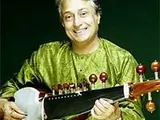WHEN MUSIC CARESSES CELESTIAL REALMS At a rare arts and culture offering over the weekend, the world-acclaimed Sarod (an Indian stringed instruments much like the Indian Sitar) Maestro Ustad Amjad Ali Khan accompanied by his sons Amaan Ali Bangash and Ayaan Ali Bangash, Tabla (Indian drums) players Vineet Vyas and Shubhankar Banerjee, and Lalitha Venktaramani on the Tanpura, gave a stunning performance at The Christel DeHaan Performing Arts Center on the campus of University of Indianapolis.
I am not a music critic. I am offering my personal impressions and reflections of an unforgettable evening:
Ustad Amjad Ali Khan transformed the space into a sacred sanctuary thrilling the spell-bound hearts of the packed house with a soulful ecstasy. As if in a meditative trance, and with a masterful touch, the Maestro let his fingers orchestrate the strings to sing, interpret, and embellish the ancient classical Indian Ragas (musical patterns) and two familiar prayer songs.
He began the concert with a deeply moving and original rendition of "Vaishnav Jana To Tane Re Kahaiye Je Pir Parayee Jane Re." That was followed by a magnificent offering in Raag Durga. Then, his two sons, the brilliant and gifted brothers Amaan and Ayaan showed their magnificent skills on the Sarod in Raag Kosi Kanra to the accompaniment of Tabla and Tanpura. Their style, technique, and artistic creativity mesmerized the audience. They display great authority, exuberant energy, and impressive stage presence.
Ustad Khan returned and together they offered a rendition of the Bengali song "Jo Dee Dakshnay To Na" by India's great sage, poet-laureate, humanitarian, and musical genius, Rabindranath Tagore. Together they sparkled, charming the listeners into unimagined emotional heights and delightful crescendos giving a measure of their awesome talent.
Throughout the nearly two hour long concert, there were standing ovations as Khan Sahib entered the Hall and at the end of the Concert. There were several spontaneous thunderous applauses at various points when the audience felt especially moved by the performance of the Sarod protgs and the Tabla masters. Individually and together, the elegant and unassuming Maestro and his accomplished sons Amaan and Ayann, and the tabla players Shubhankar and Vineet created timeless and amazing music with their absolute mastery over their instruments.
The Sarod Maestro sat on a raised platform in his deep green Kurta Pyjama. He rested the head of his beautiful Sarod that resembles an ancient Afghani Rabab but has nineteen strings on his right thigh with his left leg crossing underneath. His outstretched right foot stayed covered with an embroidered shawl. After adjusting his instrument to the right Raga and rhythm, he brought forth masterfully a rich spectrum of sounds: human voice, booming, resonating, reverberating, barely audible, and musical mosaics that repeatedly transported our spirit to celestial realms.
Ustad Amjad Ali Khan's inventive genius has added new Ragas: musical patterns and enriched the Indian classical and the world of music. He breathes new life into the strings. Music in his soul and fingers seem to honor the Master. I imagined him performing before the gods and at the Highest Court making his music offerings and adding to the sanctity and spirit of ecstasy of the holy gathering. There was playfulness and intense concentration, faint ripples and rushing musical waves, perfect symphonic harmony and individual displays of unique talents. There is an aura of divine light when he plays. Ustad Khan transcends into the amazing realms and depths of music and brings forth music of superb beauty and serene splendor. He is a cultural treasure and goodwill ambassador; a celebrated icon of hope and friendship. He reminds us that humanity's difference and divides have a universal bridge in music, dance, culture, arts, and matters of spirit. He uplifts and directs our spirit and sights towards the divine within and all around.
As I listened in awe and reverence, I had the feeling that his music was stirring and awakening emotions and cultural memories within that I did not know existed and connecting me to generations and times of long ago. Waves of sounds were emanating from the strings of Sarod as if they were under his powerful spell and in total obedience and joyful surrender filing past my senses in a colorful and dazzling procession of echoes and images. His slightest gesture of hand, head movement, glance signaled others to follow and showcase their skills with pleasure.
The Maestro reminded his audience that "Sound is God" and the "music has no religion." The Sikh scriptures and other sacred traditions affirm that sentiment as Shabd-Guru and reveal that there is celestial music resonating throughout the unfathomable heavens. During the concert, it seemed as if a little of that heavenly music, celestial energy, temporal passion, sensual pleasure, and intense ecstasy had descended into the performing hall.
Now, imagine all of that creativity from memory and spirit-guided. There is no written music. It was breath-taking, inspirational and transforming experience to treasure.
Ustad Amjad Ali Khan, a seventh-generation illustrious musician, has been enthralling audiences since the age of six. Today, achieving unimagined heights and perfection, he is among the venerated world cultural "ambassadors." Recipient of many prestigious honors, including the UNESCO Award, Padma Vibushan (highest Indian civilian awards), the "Commander of the Order of Arts and Letters" by the French Government, and the15th Fukuoka Asian Culture Grand Prize, Khan has given brilliant performances at world famous events: Edinburgh Music Festival, Carnegie Hall, World Arts Summit in Venice, and World Festival of Sacred Music with His Holiness the Dali Lama. His humility, humanity, elegance of spirit and graciousness, and incredible music offer us a glimpse of beauty and splendor personified.
The concert was organized by the India Association of Indianapolis under the leadership of its President, Mr. Haresh Gangwani with Ms. Archana Thaker serving as the Event Coordinator. The Concert sponsors included Tata Consultancy Services, University of Indianapolis, IUPUI, India Studies Program, Indiana University, International Center of Indianapolis, Lilly India Network, and Eli Lilly and Company. Dr. Jaipal Singh and Mr. Subhash Mahajan served as Program Co-Chairs. Mr. Arun Kumar, Consul General of India was in attendance and addressed the gathering at dinner that followed the concert.
Kanwal Prakash "KP" Singh
Indianapolis, Indiana USA
www.kpsinghdesigns.com
Edited by mp_142 - 19 years ago























